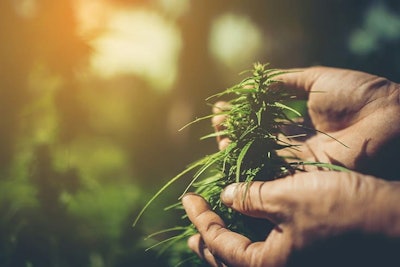
The cannabis committee at ASTM International, a century-old organization that has released more than 12,000 global standards for a wide range of industries, has turned its attention to sustainability standards.
The cannabis committee, D37, has published auditing and security standards in the past, and recently launched a subcommittee on sustainability to develop standards aligned with United Nations Sustainable Development Goals (SDGs).
RELATED: Standardizing the Cannabis Industry: A Look at ASTM International’s Process for Writing Standards
The standards will create consistency in an industry that has historically been regulated through a patchwork of state rules, according to Shawn Cooney, chair of D37’s subcommittee on sustainability.
“[The cannabis industry can] wait for [regulators] to even off the differences state by state, or the industry could stand up through the utilization of something like ASTM and get what the industry sees as standards into view, and then let the regulatory agencies mirror what the industry is basically saying the regulations should be,” Cooney told Cannabis Business Times and Cannabis Dispensary.
Cooney co-founded the Sustainable Cannabis Coalition and said the organization saw an opportunity for businesses in the space to lend their voice to the creation of sustainable practices.
“We started blogs, podcasts, and we got great traction,” Cooney said. “Companies were learning that this was something they needed to learn about also. … We looked at sustainability as a space where there could be some good traction and some good input and some good action that could happen.”
Cooney and his colleagues approached the D37 committee about launching a “specific subcommittee that would encompass all things sustainable,” he said. The committee then decided it would be a good addition to the other subcommittees within the cannabis group at ASTM, which include subcommittees on cultivation, laboratory testing, quality assurance, manufacturing, processing, security and retail.
The new subcommittee’s overall goal is to help the cannabis industry be more efficient, transparent and well-regulated, and the standards it ultimately publishes will promote measurement, reporting and improvements made toward sustainability goals.
The subcommittee’s only action so far was to name Cooney as its chair and Jen Rumble, the director of communications for the Sustainable Cannabis Coalition, as its co-chair.
ASTM International writes standards in one of two ways. In some instances, a group of people who are interested in a particular standard will come together and collaborate on it, as Cooney and the other members of the cannabis subcommittee on sustainability plan to do.
Other times, one individual will volunteer to write a standard, and in that case, the author will send a draft of the standard out for ballot, where it is posted online for subcommittee participants to review and submit feedback. The author can then choose to revise the standard based on the comments, and then it would be put out for ballot a second time before being finalized and released as an approved standard.
Each ASTM International committee meets twice a year. The cannabis subcommittee on sustainability will hold its first meeting Nov. 5.
The subcommittee will relate its standards to five of the 17 United Nations SDGs: No. 7 on affordable clean energy; No.9 on industry, innovation and infrastructure; No. 10 on reduced inequalities; No. 12 on responsible consumption and production; and No. 13 on climate action.
“We’ll initially focus on greenhouse gas and … targeting some real simple things: the measure, report, and improvement as the goal of the standard for lighting, HVAC, extraction, CO2 creation and use, fertilizer, and then the supply chain overview,” Cooney said. “It’s a very broad set of greenhouse gas components, and I think that’s where we’re going to start with the group.”
The sustainability standards will ultimately help cannabis businesses measure and improve energy use over time.
“I’m not saying we can magically make your energies go away, but you can acknowledge what you’re doing, measure it, understand it, and then have a plan for improving it with 2030 and 2050 goals,” Cooney said. “That will be our first project that we’ll be trying to submit.”
“I think if the industry doesn’t stand up, there will be vast changes. If the industry can put forth … some good standards for the federal government to look at and adopt, that will be the long-term benefit. There won’t be a great yawning change that will happen as the federal government looks at becoming involved.”
- Shawn Cooney, Chair, ASTM International Cannabis Subcommittee on Sustainability
Subsequent projects will address water use, waste management, and diversity, equity and inclusion in the industry.
“There is a huge amount of … diffuseness or a lack of focus in the standards because they’re state by state,” Cooney said. “[Other industries] look to UL, NIST, ASTM and all these acronym organizations that are involved in standards to develop what the … regulations should be. … Since there was a large cannabis group already existing in ASTM, it seemed like that was the place to do it. With 1,000 members of the cannabis group, it seems like there’s a critical mass there to be able to get a consensus around a standard of one sort or another and to have it be valid.”
The ASTM International process will help the cannabis industry develop its own standards before federal legalization opens the door to government regulation, Cooney said.
“I think if the industry doesn’t stand up, there will be vast changes,” he said. “If the industry can put forth … some good standards for the federal government to look at and adopt, that will be the long-term benefit. There won’t be a great yawning change that will happen as the federal government looks at becoming involved.”
Cooney said the standards that the cannabis subcommittee on sustainability ultimately develops could one day fit into U.S. Department of Agriculture (USDA) or Food and Drug Administration (FDA) regulatory structures, should these agencies be charged with overseeing the industry when cannabis is federally legalized.
The subcommittee plans to have its first standards published early next year, and Cooney said that the Sustainable Cannabis Coalition is also working on separate projects related to sustainability in the industry.
The organization has partnered with Dartmouth University’s College of Engineering and a few cannabis cultivators to optimize production facilities to be 60% to 80% more energy efficient than those currently in use for commercial cannabis cultivation. The data gained through this project over the next six to eight months will help guide the cannabis subcommittee on sustainability’s standards, Cooney said.
The Sustainable Cannabis Coalition is also working with a software company to create a cannabis-specific version of a sustainability analysis and reporting tool so that “the measuring, reporting and goals that people should be setting will be able to be reported out in a way that’s intelligible,” Cooney said.
“We’re hoping to be able to start working from the knowledge gained as the Sustainable Cannabis Coalition and parlaying that knowledge into standards,” he said.

























